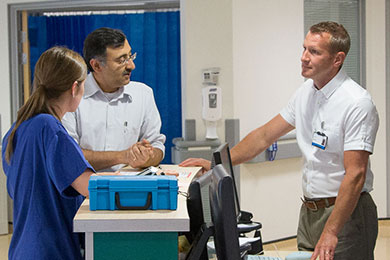It’s been reported today that survivors of hospital admission with COVID-19 are at increased risk of readmission or even death in the 6 months following hospital discharge.
The study – by the Office for National Statistics, University College London and the University of Leicester – examined the records of nearly 48,000 people admitted to hospital between January and August 2020 and compared them with ‘matched controls’ (similar people who had been admitted to hospitals with something other than COVID-19). It found that 29.4% of survivors were readmitted to hospital and 12.3% died. Just over 10% of people included in the study had been treated in Intensive Care Units, with the majority receiving only ward-based care.
The news is alarming, but not altogether surprising. This article aims to present a balanced view and offer pragmatic advice to people who have recently survived severe COVID-19 and are, quite understandably, concerned about the news. It should be noted that the study did not look at people who had managed their symptoms at home. It’s likely that people who were not hospitalised are a lower risk, but of course not immune to the ‘adverse events’ described. These were:
- Death
- Readmission to hospital for any reason, or a ‘new’ diagnosis of
- respiratory disease (including asthma and COPD)
- cardiovascular disease (including heart attack, stroke, high blood pressure or problems with heart rhythm)
- diabetes
- kidney disease or
- liver disease.
The authors found that people were more likely to have one of these ‘adverse events’ if they were over 70 years of age, or from black, Asian or ethnic minority backgrounds, but of course they happened to people without underlying risk factors too.
It’s critically important to note that this article is what’s known as a preprint – as such, it hasn’t yet been through a rigorous process of peer review and might ultimately be published with different or softer conclusions, or not at all. It’s also important to note that more than half of people admitted to hospital with COVID-19 had underlying high blood pressure and more than 40% had underlying respiratory disease.
Why’s this important? Because it’s quite likely that, amongst the 1 in 5 people who had a new diagnosis of respiratory disease made after their admission with COVID-19, a proportion will have had underlying lung disease which has not previously been diagnosed (for example, the ex-smoker who had stopped because they had found they were getting a little more breathless but who hadn’t been to see their doctor). Again, adverse events did happen in otherwise healthy people but less frequently, meaning that someone who is relatively young and otherwise healthy will have a much lower risk of an adverse event than reported.
It’s already been widely reported that COVID-19 can cause long-standing damage to lungs in some sufferers, and that abnormal findings on echocardiogram (a scan which shows how well the heart is working) are identified in some survivors.
This new study also reinforces that COVID-19 is a multiorgan disease, with (for example) around 1 in 100 survivors having a ‘new’ diagnosis of diabetes and a slightly smaller number having a new diagnosis of kidney disease. Indeed, a previous study, also in the UK, found that 1 in 4 people who’d survived the disease had evidence of ‘mild’ impairment of more than one organ, with the risk being far higher in those who’d been admitted to hospital.



